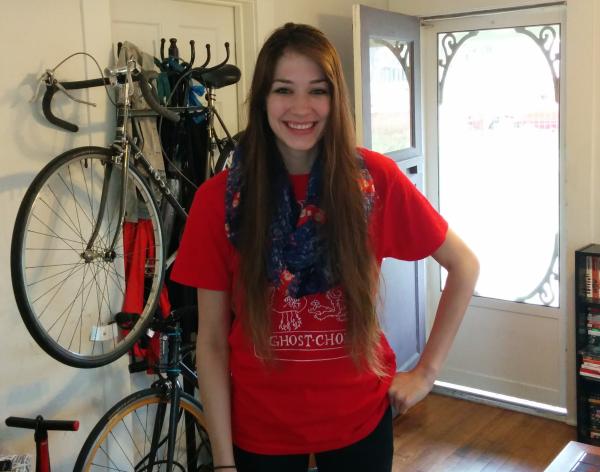Behind the Scene: Kayla Schmandt
Welcome to Behind the Scene, a biweekly series where Flagpole and Dirtty Toe Productions profile the people who work offstage to make Athens music matter.

WHO SHE IS: Kayla Schmandt
WHAT SHE DOES: Head retail coordinator for new release promotion at Colortest
WATCH:
Flagpole: How did you wind up in your position?
Kayla Schmandt: When I was an undergrad, I worked at Team Clermont. I was looking for an advertising internship, and it just sort of came up. I hadn’t really thought about working in music at that point. I’ve always enjoyed music, but I really [just] wanted some internship experience. I started working there and fell in love almost immediately. I was like, “I can work in music and make that a real job? That’d be amazing!” So, I did that and I loved it. I graduated and got a job at a digital advertising firm in Atlanta—I took it because it was the first job offered, and I would’ve felt bad turning down a sure thing. But I quit three months in, because I hated it and wanted to go back to music. After that, I worked in everything else—booking, merch—and publicity is what I was good at. I recently started working at Colortest, which does more retail promotion.
Describe your daily routine.
I get to wake up kind of late [laughs]. I wake up around 10 or 11, because most of my work happens after record stores are already opened. I’m focused more on the retail publicity right now. So, my day consists of talking to 50 to 60 different retailers around the U.S. and getting them to promote or pick up new releases from artists that I’m working with. Once they pick it up, I help them promote it in the store—whether that [means] in-store performances or display contests, setting up listening stations. My day is just talking to indie record stores. I talk to people who love music about music. It’s great.
Do you think that the average record-buying person is aware of your job?
No, I don’t think they have a clue. I don’t think people who aren’t in the industry know how a record store picks its records. I think they think they’re just there, or that [the store picks] up everything. It’s a very selective thing in a time when retail isn’t as popular, with all of the digital stuff going on… But in this day and age, after cutbacks on the distribution side of things, record stores need people more than ever to tell them about these new releases, because they’re not hearing about them.
Is it an uphill battle, with the increased presence of digital downloads and streaming services?
Kind of. But we saw an interesting thing this past year, with vinyl sales improving dramatically and digital sales decreasing for the first time since they came around. I don’t know. It’s definitely hard working in this industry, and it’s constantly in the back of your head: “Am I going to have a job in the next few years?”
I talk to people who love music about music. It’s great.
But I do know there have been record stores opening every day, which has not been the case in the past—they were closing. That’s more of what you hear about, but now stores are opening again. It gives me hope.
What makes a promotion a success to you?
When I talk to prospective clients and try to sell them on the idea of what I do and it actually works—it’s definitely sales-related. The other [measures of success] are the free programs I can secure. Record stores have listening stations, and you can see advertisements or promotions for a record. A lot of people don’t think about it, but [often times] you have to pay for those things, as a label. You have to pay to get them in a listening station. You have to pay to get a poster in a particular location. If it’s in the front, someone paid for that. Part of my job is to get that stuff for free. So, the success of a campaign can be based on the amount of free stuff [I secure], which may reflect in sales.
What advice would you give to bands?
Well, it’s hard for bands that are just starting out, or that may not be on a label, or that don’t have a distributor to ship out their product. I can’t really work with them. I need the distribution to get to the record stores, which makes it hard for me. There are so many bands that have great releases that I’d love to get into stores.
I do think it’s important to factor publicity into the business of your band… It can be expensive to have publicity, but if you aren’t going to hire it out, make sure you’re doing it yourself. When you’re just starting out, people aren’t going to listen to it if you don’t put it out there and put the effort behind it. So, if you can’t hire someone to do it for you—or don’t want someone to do it for you—do it yourself.
Have there been any memorable campaigns that are representative of what you do?
Two come to mind. The first one because it was just extremely fun to do—the new of Montreal album. Being in Athens, the hometown of that band, working from here was incredibly fun. To walk into record stores here and talk about the product, because they all know the band, that was fantastic.
I ran into a friend of a friend at South by Southwest, and we sat down and started talking about music. Two months later, he called and said, 'We need an assistant. What are you doing?'
But one of the campaigns that I will remember the most is when I was that I was having an effect. That was with a band called Radiation City. We worked on their new release, which was back in March of last year, and we saw a post of the first-day sales from indie stores. Granted, it was pretty low on the chart, but in conversations we had with buyers, no one had any idea of who this band was… To see them show up on a physical sales [chart], to see a presence that was directly related to us—that felt special to me. I felt like I did something to help them, and that was the first time I saw [that].
What advice would you give someone looking to work in music publicity?
The best advice I could give would be to put yourself out there… Go to more shows. Talk to people. Read Flagpole. Write letters. Write album reviews. Talk to everyone you can about music, and you will wind up meeting the people that will help your career. I got one of my first jobs when I ran into a friend of a friend at South by Southwest, and we sat down and started talking about music. Two months later, he called and [said], “We need an assistant. What are you doing?”
You have to be out and about in the scene and it will happen… If you want to work in the music industry, you can’t give in to any other option. It’s an easy industry to get started in. It’s pretty hard to get your first job, and you have to resist the urge to get a high-paying job that [doesn't] have anything to do with what you love. Go for it. You’ve got to be really committed.











comments